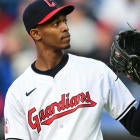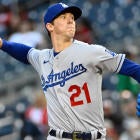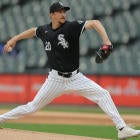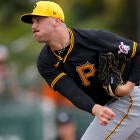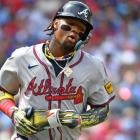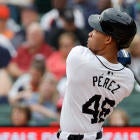Let’s start this with a truth that I believe we’ve all accepted. Spring Training numbers, as a rule, do not matter. C.J. Cron is hitting .457 and Mike Trout is hitting .227. Nobody cares.
Now that that’s out there, let’s go back to a lesson you learned in second grade when nobody could figure out why the i didn’t come before the e in weird. There are exceptions to every rule.
What are the exceptions to the Spring Training stats rule? For me it starts with these six:
9 innings
Lance Lynn was the first pitcher to reach nine innings and the first pitcher to go four innings in a start. Why does that matter? Because he hasn’t pitched in a major league game since 2015.
I placed Lynn in my Sleepers 1.0 column because Lynn has had plenty of time to recover and the Cardinals have no reason to protect his arm because he’s a free agent after this year. His performance (and more importantly the team’s usage of him) so far ensures that he’ll stay in the second version of the column.
I would project Lynn for double-digit wins, a mid-3s ERA and pretty close to a strikeout per inning. This early usage gives me hope that his inning total will be in the neighborhood of the 188 he averaged from 2012-2015. If so, he’s a solid No. 4 starter that is available in the very late rounds.
29 percent
According to Brooks Baseball, Taijuan Walker is throwing his slider 29 percent of the time this spring in place of a curveball that was ineffective at best in 2016. This could be a huge development for a pitcher who made my breakouts list and has still yet to turn 25 years old.
Walker struggled in 2016, specifically giving up an .809 OPS to right-handed batters. For his career he’s given up slightly worse number to RHH, but it was more pronounced last year. If Walker can turn the slider into a true out pitch against righties, he could finally deliver on the expectations we’ve had for him.
He should also come with the disclaimer that we’ve been here before. In 2015 Walker struck out 26 batters over 27 spring innings, posting an ERA of 0.67 and a WHIP of 0.44.
2
Alex Dickerson is back on the shelf after just two spring plate appearances and is now questionable for opening day, which opens a spot in the Padres outfield. Manuel Margot is a fantastic prospect and Travis Jankowski did a fine job last year, but Jabari Blash is making a major push to be included.
Blash is a former prospect who looked like a 27 year old on his way out of the Padres outfield. But this power surge is not completely without precedent.
From 2013-2015, Blash hit 75 home runs over 1,280 PA. In his AAA career he has 44 long balls 646 PA. In other words, the power has always been there. So have the strikeouts. In Blash’s short major-league stint last season, he struck out in 40 percent of his plate appearances. So far this spring that number is below 25 percent. While Margot and Jankowski are both speedsters, Blash could bring some power to a Padres team that is pretty short on it. Keep an eye on him the rest of the spring.
.147
Maybe it shouldn’t bother me so much that one of my favorite deep sleepers isn’t even flirting with the Mendoza Line. After all, batting average is a bad stat. Let’s check the other numbers.
So... not great. Soler came to Kansas City in the Wade Davis trade and the team sees him as a part of the future. He just turned 25, so there’s plenty of reason to think his best days are ahead of him, but this is a pretty awful start.
If the spring struggles mean that Soler will start the season in the bottom third of the order, and that will really hurt his chances to deliver on his sleeper potential. He needs the protection and the run producing opportunities that come with a spot in the first five or six places in the order. He picked up his first extra base it on Tuesday, so maybe things will start to turn around.
2:1
Wil Myers’ 2016 was a tale of two seasons. In the first half he was an all-world player, and after the break he turned into a worse version of the player he’d always been. One drastic change was that he posted a 20.6 percent K rate in the first half that jumped to 27.6 percent in the second half. So far this spring he’s walked twice as often as he’s struck out.
I don’t believe that Myers is going to come anywhere close to the 12 percent K rate he has so far this spring, but getting to a situation where he strikes out less than twice as often as he walks would be a huge help in duplicating the full-season numbers he put up in 2016. As a reminder, that 2016 season was pretty special.
5 players went 20/20/90/90 last year
— Heath Cummings (@heathcummingssr) March 2, 2017
Jose Altuve
Mookie Betts
Mike Trout
Paul Goldschmidt
Wil Myers
4
Yoan Moncada was always a long shot to make the White Sox to start the season, even after they released Brett Lawrie. Still, a lot of people are considering drafting him as a stash. Moncada’s four errors early in the spring certainly aren’t helping his cause and his offensive number aren’t much better.
Moncada has struck out in more than a third of his plate appearances and has been caught stealing in his only attempt. None of this is enough to change the fact that he’s one of the best prospects in baseball. It’s just to say he has done nothing to show he’s close to being ready for the major leagues.
Drafting Moncada is a gamble that he’ll be called up before you need that roster spot. I said earlier this winter that June felt like a best-case scenario for Moncada, but he could have changed my opinion on that over the past couple of weeks. He’s done no such thing.
If you have a minor league spot, he’s a no-brainer. If you have a deep bench, it’s fine to take a shot late in the draft. But on a standard roster I can’t tie up a bench spot on a player who has shown no indication he’s ready for the major leagues.



























